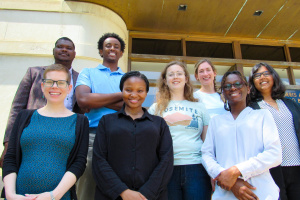
Evan Lieberman
Total Professor of Political Science and Contemporary Africa
Director, Center for International Studies
Political economy of development; ethnicity/identity; public policy; research methods; accountability; governance; democracy; state-building; Africa.
Biography
Evan Lieberman is the Total Professor of Political Science and Contemporary Africa and is Director of the Center for International Studies. He also directs the Global Diversity Lab (GDL) and MIT’s global experiential learning program, MISTI
Lieberman conducts research on the political-economy of development, focusing on the democratic politics of governing ethnically and racially diverse societies, including with respect to the challenges of public health, climate adaptation, and ensuring respect for human dignity. In his work, which is mostly focused on sub-Saharan Africa, Lieberman employs a mix of research methods, including the fielding of original surveys, experiments, comparative-historical analysis, and in-depth interviews.
Lieberman received his Ph.D. from the University of California, Berkeley. Previously, he was Professor and Associate Chair in the Department of Politics at Princeton University (2002-14). In addition to his present MIT appointments, Lieberman co-coordinates the Boston-Area Working Group on African Political-Economy (BWGAPE), is a member of the E-GAP network and its steering committee on climate governance, and is a fellow of the Canadian Institute for Advanced Research (CIFAR).
Lieberman is the author of Until We Have Won Our Liberty: South Africa after Apartheid (Princeton University Press, 2022), Boundaries of Contagion: How Ethnic Politics have Shaped Government Responses to AIDS (Princeton University Press, 2009) and Race and Regionalism in the Politics of Taxation in Brazil and South Africa (Cambridge University Press, 2003). He has also published articles in the American Political Science Review, the British Journal of Political Science, the Annual Review of Political Science, Comparative Political Studies, Politics & Society, Studies in Comparative International Development, the Journal of Experimental Political Science, the Journal of Democracy, and World Development.
Research
Evan Lieberman employs a range of empirical research methods to better understand the causes and consequences of policy-making, conflict, and human development especially in sub-Saharan Africa. His current projects include a study of the drivers of local and polycentric service delivery in Southern Africa; field experiments investigating the relationship between information provision and citizenship in East Africa; conceptual, case study, and statistical analyses of the institutionalization of ethnic categories around the world; and survey experiments on social identity and perceptions of health-related risks. He is also working on problems of research design and multi-method causal inference in comparative research.
Select Recent Publications
“Nuanced Accountability: Voter Responses to Service Delivery in Southern Africa,” (with Daniel de Kadt). British Journal of Political Science, December 2017, 1-31.
“Census Enumeration and Group Conflict: A Global Analysis of the Consequences of Counting” (with Prerna Singh). World Politics January 2017, 1-53. Data and code are available at Harvard Dataverse (DOI: doi:10.7910/DVN/KJV6OJ).
“Can the Biomedical Research Cycle Be a Model for Political Science?” Perspectives on Politics, vol. 14, no. 4, 2016, pp. 1054–1066.
“Response to Symposium Reviewers.” Perspectives on Politics, vol. 14, no. 4, 2016, pp. 1080–1082.
For a complete list, please visit https://evanlieberman.org/publications/
News
Biography
Evan Lieberman is the Total Professor of Political Science and Contemporary Africa and is Director of the Center for International Studies. He also directs the Global Diversity Lab (GDL) and MIT’s global experiential learning program, MISTI
Lieberman conducts research on the political-economy of development, focusing on the democratic politics of governing ethnically and racially diverse societies, including with respect to the challenges of public health, climate adaptation, and ensuring respect for human dignity. In his work, which is mostly focused on sub-Saharan Africa, Lieberman employs a mix of research methods, including the fielding of original surveys, experiments, comparative-historical analysis, and in-depth interviews.
Lieberman received his Ph.D. from the University of California, Berkeley. Previously, he was Professor and Associate Chair in the Department of Politics at Princeton University (2002-14). In addition to his present MIT appointments, Lieberman co-coordinates the Boston-Area Working Group on African Political-Economy (BWGAPE), is a member of the E-GAP network and its steering committee on climate governance, and is a fellow of the Canadian Institute for Advanced Research (CIFAR).
Lieberman is the author of Until We Have Won Our Liberty: South Africa after Apartheid (Princeton University Press, 2022), Boundaries of Contagion: How Ethnic Politics have Shaped Government Responses to AIDS (Princeton University Press, 2009) and Race and Regionalism in the Politics of Taxation in Brazil and South Africa (Cambridge University Press, 2003). He has also published articles in the American Political Science Review, the British Journal of Political Science, the Annual Review of Political Science, Comparative Political Studies, Politics & Society, Studies in Comparative International Development, the Journal of Experimental Political Science, the Journal of Democracy, and World Development.
Research
Evan Lieberman employs a range of empirical research methods to better understand the causes and consequences of policy-making, conflict, and human development especially in sub-Saharan Africa. His current projects include a study of the drivers of local and polycentric service delivery in Southern Africa; field experiments investigating the relationship between information provision and citizenship in East Africa; conceptual, case study, and statistical analyses of the institutionalization of ethnic categories around the world; and survey experiments on social identity and perceptions of health-related risks. He is also working on problems of research design and multi-method causal inference in comparative research.
Select Recent Publications
“Nuanced Accountability: Voter Responses to Service Delivery in Southern Africa,” (with Daniel de Kadt). British Journal of Political Science, December 2017, 1-31.
“Census Enumeration and Group Conflict: A Global Analysis of the Consequences of Counting” (with Prerna Singh). World Politics January 2017, 1-53. Data and code are available at Harvard Dataverse (DOI: doi:10.7910/DVN/KJV6OJ).
“Can the Biomedical Research Cycle Be a Model for Political Science?” Perspectives on Politics, vol. 14, no. 4, 2016, pp. 1054–1066.
“Response to Symposium Reviewers.” Perspectives on Politics, vol. 14, no. 4, 2016, pp. 1080–1082.
For a complete list, please visit https://evanlieberman.org/publications/


